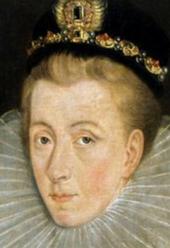"I welcome you into my Court."
With my mother; by Bernard Lens III circa 18th century
My parents
Robert Carlyle as me in a scene from BBC drama "Gunpowder, Treason and Plot"
My name is James Stuart and I was born to Mary Stuart, Queen of Scots and Henry Stuart, Lord Darnley on June 19th, 1566 at Edinburgh Castle in Scotland as their first child. My mother, Mary Queen of Scots, experienced the tumultuous reign both religiously and politically after her mother's regency. My mother, along with my grand mother, Marie de Guise, had to face the Protestant Lords who rebeled against them. After my father was murdered in February 1567 with an explosive, my mother and my uncle, Earl of Moray, fought against each other. In June 1567 at Carberry Hill, she was defeated by Moray and abdicated her throne in favor of me. I never really understood why my uncle Moray showed such a hostility toward his own sister. Funded by my predecessor, Queen Elizabeth, he was vigorously scheming with other Scottish nobles against her in court. The following quote of mine shows how I considered him; "bastard that who unnaturally rebelled and procured the ruin of his own sovereign and sister."
The Londinium Arch at Fenchurch, constructed in London for my Royal entry in 1604
I became King of Scotland at 13-month-old on July 24th, 1567 and was raised by the Protestant lords, most notably the Earl of Mar and my Presbyterian tutor, George Buchanan. I acted cautiously throughout my life try not to repeat my mother's fate and patiently waited the opportunity to succeed the English crown. Although Elizabeth had never considered me as her heir, I was declared by the Privy Council an heir to the English throne upon her death in 1603. Thus the Union of the Crowns occurred, the achievement that I longed for my entire life. I became the first King to ever inherit the both Scottish and the English thrones. During my reign of 22 years as a King of England and Ireland, I was considered a highly successful King and an accomplished scholar, and I would like to make my attribution to my tutor George Buchanan and Sir Francis Bacon.I published several books in Latin and authored some scholaristic works in English. One of my famous achievements is the authorization of the production of the King James version of the Bible. I also commissioned numerous portraits, on both a grand and a miniature scale, to help recognition of the Stuart dynasty in England and Ireland.
Me at my Court with my son Charles
Pocahontas, the famous Native American Princess, once paid me a visit with her Egnlish husband John Smith.
Alhough people often assume that I tried to distance myself from my own mother, it is not true. Not only I transferred her remains with her head intact to Westminster Abbey right after my ascension to the English throne, I tried to destrtoy Fotheringay Castle where she was executed. It was painful to see such a place still existed. We could not communicate with letters, let alone visit in person, but I always thought about her. Even though my memory with her is very limited, we shared similar traits in our personalities, such as outgoingness and interests in arts in general.I knew that inheriting the English throne and to achieve the Union of the Crowns was her wish, and in order to do so, we had to sever any contacts with each other to avoid any speculations.
My mother, Mary, Queen of Scots, whose innocence I strongly believe and support, no what matter what had happened amongst our entourage.
During my reign, I took such thing as witchcraft very seriously and even created a statute that prohibited it. The picture above is me at a witchhunting trial.
Elizabeth I: My predecessor. I managed to retain a stable relationship with her.
Sir Francis Bacon, my statesman
My famous quotes: "Kings...have power of raising and casting down, of life and death, judges over all their subjects...and yet accountable to none but God only."
"Look not for the softness of a down pillow in a crown, but remember that it is a thorny piece of stuff and full of continual cares."
"For Mary's quest is halted and faulted by her love of Bothwell, whereas her son James succeeds where she fails because he learns that to show love, mercy or compassion is a weakness. James' journey is more jagged, and much darker. He captures the prize that eluded his mother's grasp, and in some strangely twisted way he did it all to justify his mother's love." - Gub Neal, a producer for BBC drama "Gunpowder, Treason and Plot"
